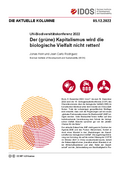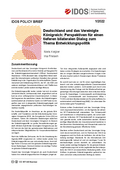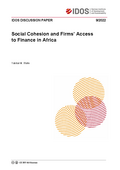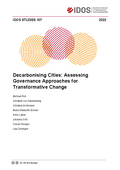-

Publikationen
Photo: www.shutterstock.com/de/image-photo/pont-du-gard-old-roman-aqueduct-45688924
Publikationen
Das German Institute of Development and Sustainability (IDOS) gibt vier eigenständige Publikationsreihen heraus. In Discussion Papers, Policy Briefs und Studies veröffentlichen die Wissenschaftler*innen des IDOS ihre aktuellen Forschungsergebnisse. Auch Gastwissenschaftler*innen und Kooperationspartner haben die Möglichkeit, ihre Forschungsergebnisse in einer der IDOS-Reihen zu publizieren. Publikationen der 2022 eingestellten Reihen Analysen und Stellungnahmen, Briefing Paper sowie Two-Pager / Zweiseiter sind weiterhin online verfügbar. Die vierte Publikationsreihe ist für Meinungsbeiträge vorgesehen: Regelmäßig kommentiert die Aktuelle Kolumne die neuesten Entwicklungen und Themen der internationalen Entwicklungspolitik.
Wissenschaftler*innen des IDOS veröffentlichen ihre Forschungsergebnisse zudem regelmäßig in referierten und nicht referierten deutschen und internationalen Fachzeitschriften und Publikationsreihen anderer Forschungseinrichtungen und Institutionen sowie bei renommierten Buchverlagen. Zusätzlich nutzen sie Blogs und Online-Plattformen der Partnerinstitutionen, um die Forschungs- und Beratungstätigkeit des Instituts einer interessierten Öffentlichkeit zu vermitteln.
Es wurden 9409 Ergebnisse gefunden. Zeige Ergebnisse 161 bis 170 von 9409.
-
On the edge: delays in election results and electoral violence in Sub-Sahara Africa
-
Patent enforcement and quality upgrading of exported products
-
Successfully "holding the line": the EU and the outcomes of COP28
-
Dürrebekämpfung braucht mehr globalen politischen Schub
-
Aid for trade might facilitate ‘deep’ trade agreements, but it’s not that simple
-
Entwicklungszusammenarbeit und Humanitäre Hilfe
-
Relational contracts in the Rwandan coffee chain
-
The European Union’s governance approach to tackling disinformation – protection of democracy, foreign influence, and the quest for digital sovereignty
-
Kohärenz stärken: wie ein integrierter Ansatz in der deutschen Afrikapolitik gelingen kann
-
Keine Abstriche bei Entwicklungspolitik











